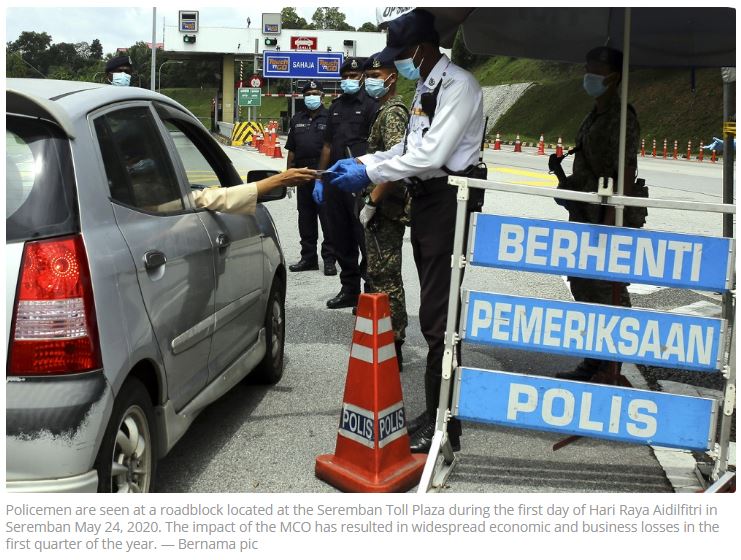Malaysia: Statistics Dept’s study shows widespread business losses in first quarter of 2020, due to MCO
KUALA LUMPUR, June 5 — The impact of the movement control order (MCO) first implemented on March 18 has resulted in widespread economic and business losses in the first quarter of the year, a study conducted by the Department of Statistics Malaysia (DOSM) showed.
DOSM’s study on the impact of MCO in Johor, Melaka, Negri Sembilan, and Sarawak was derived from their officers who monitored the situation on-ground.
For example, the retail sale of telecommunications equipment in Johor recorded a drop of 60 to 70 per cent, as a result of businesses not being able to operate. The study noted that rental costs and employees’ wages still had to be paid during this time.
“Most companies involved in the manufacturing sector for Johor are projected to experience losses in the first quarter of 2020. This includes the paint-making industry which is expected to lose up to 60 per cent of business by the second quarter,” DOSM said.
It added that if the MCO is extended, it could have a worrying impact on paint-making in Johor with regards to cash flow and a loss of international clients to other competitors.
Other industries in the state include wood and rattan furniture, which is expected to lose up to 38 per cent in the first quarter, the printing industry which can lose up to RM1.5 million in revenue, and the pharmaceutical industry which has lost RM9 million since the MCO began.
In Melaka, industries affected by the MCO included retail shoes, which has experienced a 50 to 90 per cent loss of revenue, and bridal services which saw a drop of 75 per cent in March alone as many customers were forced to cancel their reservations when the MCO came into effect.
“Among the 1,332 registered restaurants and eateries in Melaka, sales dropped by 80 per cent in March, with some establishments reporting 10 or fewer customers a day.
“The motorised vehicle manufacturing industry, which contributes approximately 26.6 per cent to Melaka’s manufacturing sector, is estimated to have seen a 50 to 60 per cent drop in sales in March alone,” it said.
Negri Sembilan’s chemical and chemical products manufacturing industry involving fertiliser production, print ink production, as well as soap and cleaning materials production, have seen their sales nearly halved during the MCO.
Although companies in this industry were allowed to operate, the reduced sales are attributed to shortened operational hours, reduced output capacity by half, and a rotational system for employees who are present for work.
The wholesale services for the waste and scrap industry, which mainly deals with the sale of industrial chemicals, fertilisers and agro-chemical products, is expected to lose up to 30 per cent in revenue.
Similarly the rubber scrap industry, which buys from small tenant rubber tappers, is expected to lose as much as 75 per cent in revenue as a result of the MCO.
Also impacted is Negri Sembilan’s glass manufacturing and non-metallic mining industry, which was not allowed to operate, saw a 30 per cent reduction in output during this time.
For Sarawak, groceries, cold storage facilities, convenience stores, gas stations and supermarkets were allowed to operate during the MCO, which have nonetheless impacted their sales.
“Sales were estimated to have dropped by 50 per cent during this time, with a reduction in stocks and the existing workforce.
“Vehicle repairs including for motorcycles were also not allowed to operate. The few which did could only do so by directly calling the workshop’s owner,” said the report.
Source: https://www.malaymail.com/news/malaysia/2020/06/05/statistics-depts-study-shows-widespread-business-losses-in-first-quarter-of/1872716


 English
English




